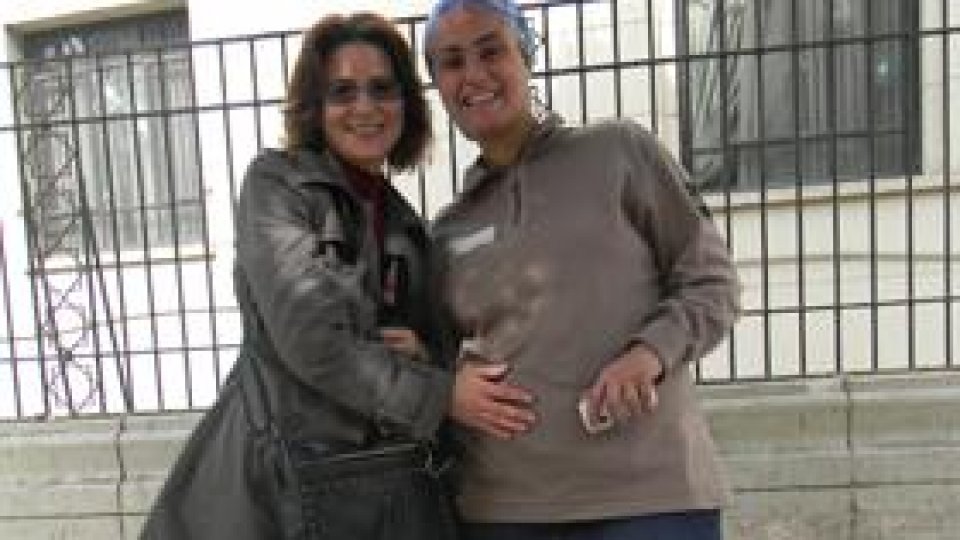Behind the barricades in Egypt
A pregnant young woman helps the protesters in Tahrir Square in Cairo. Accompanied by her husband, she brings food and water to the people who spend the night in the square.
Articol de Carmen Gavrilă, 04 Februarie 2011, 11:07
A barricade errected by the anti-regime demonstrators in Tahrir Square.
It is made of large pieces of plate iron which carries messages against President Hosni Mubarak. There is a small opening on one side big enough for one people to get through.
On one side and the other, a few women and about four men have the task to search those who come behind the barricades, no matter if they are protesters or journalists.
 |  |
| The protesters carry out searches in the square. | Piaţa Tahrir arată ca o zonă de război. |
A young woman which introduces herself by the name May, explains to me why: ‘We are trying to avoid what happened on Wednesday night, when the president’s supporters came to our area wearing knives, machetes, sticks and white weapons’.
I look down and I see that the young woman is pregnant: ‘Congratulations, how many months are you?’ ‘Six months’ the woman answers and although she seems worried, she gives me a smile. ‘You come here, in the square in your condition, aren’t you afraid that you will get hurt?’, I ask her. ‘Oh, yes, I am afraid but I cannot stay aside, my husband was the first person who arrived here last week, now we come here every day. I simply couldn’t leave him alone, I had to stand by him.’
‘You come here, in the square in your condition, aren’t you afraid that you will get hurt?’, I ask her. ‘Oh, yes, I am afraid but I cannot stay aside, my husband was the first person who arrived here last week, now we come here every day. I simply couldn’t leave him alone, I had to stand by him.’
May smiles, shrugs her shoulders and continues: ‘Today I brought with me as much as I could carry, in the morning I looked for open stores and I bought food and water to bring back to the people who stay in Tahrir all the time, in tents and cannot search for food; in the evening, we make fires to keep us warm.’
I ask her how long she plans on staying in the square. ‘Until Mubarak steps down or until real negotiations are carried; we are all tired, we want to go back to normal, the whole Egypt is tired’, May answers.
Photo: Anti-Mubarak demonstrator
Two young women wearing long Islamic clothes and their hair covered come to us. They give May two pack of biscuits and they tell her something in Arab. May explains to me laughing: ‘They’ve told me to eat something and to sit down a little bit.’
One of the young women intervenes: ‘She has been standing here, at the search point since morning.’
May smiles and shrugs her shoulders: ‘This is the least I can do, pregnant as I am; I help the way I can.’
An older woman holding the hand of an adolescent girl comes to us and greets May: ‘We’ve got to know each other, we’ve been staying here for days’, May explains.

Photo: The members of the Muslim Brotherhood are in the middle of the protesters.
The woman greets me and says to me in bad English: ‘The soldiers at the checkpoint didn’t confiscate either the food that we brought with us or the bandages for the wounded that don’t want to go hospital.’
A young man passes by and when he sees me with the camera in my hand he makes the victory sign and goes to the tanks. The tanks are a few metres away and there are soldiers and protesters on top of them. He has a bandage on his cheek. ‘He’s my nephew, the woman says, he was beaten by some Mubarak supporters last night.’
 |  |
| The anti-regime protesters sit down on tanks, close to soldiers. | A young protester that was hurt in the battle against Mubarak supporters on Thursday morning. |
Helicopters are flying above us and the anti-Mubarak group behind the barricades starts yelling ‘Mubarak, go away’ as they see a larger group of supporters of the President stopping to wave flags at about 20 metres away from the barricade.
They leave the anti-Govern camp and go to the pro-Mubarak camp. The atmosphere is tensed. I ask a man: ‘Why did you come?’ He answers: ‘Well, not everybody in this country is against Mubarak, let’s not forget that he kept us protected for the last 30 years, he’s a soldier, a trustful man.’
As for the men behind the barricades, who are asking the President to leave, he seems conciliatory: ‘Their requests should be listened to, concerning not Mubarak’s stepping down, but the need for dialogue between both sides; we must all stop yelling, sit down and talk.’
A young man shouts over his last words: ‘Baradei go, USA used Mubarak now, USA betrays Mubarak.’ I leave and behind me, the two men start talking passionately.
Translated by: Iulia Grosu,
MA student, MTTLC, Bucharest University















